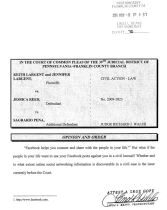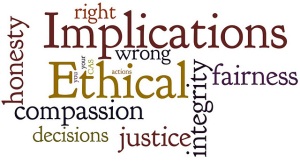 Another Pennsylvania court recently ruled that information posted by a party on their personal Facebook page is discoverable and ordered the plaintiff to provide their user name and password to enable the production of the information. Largent v. Reed, Case No. 2009-1823 (C.P. Franklin Nov. 8, 2011) features a detailed and instructive 14 page opinion from Court of Common Pleas Judge Richard J. Walsh that is a must read for anyone remotely interested in the topic of electronic discovery of social media. It is one of those well-written legal opinions that I liked to use as a framework for my motions on a given subject back in my litigation days.
Another Pennsylvania court recently ruled that information posted by a party on their personal Facebook page is discoverable and ordered the plaintiff to provide their user name and password to enable the production of the information. Largent v. Reed, Case No. 2009-1823 (C.P. Franklin Nov. 8, 2011) features a detailed and instructive 14 page opinion from Court of Common Pleas Judge Richard J. Walsh that is a must read for anyone remotely interested in the topic of electronic discovery of social media. It is one of those well-written legal opinions that I liked to use as a framework for my motions on a given subject back in my litigation days.
The case arose out of a chain-reaction automobile vs. motorcycle accident from which the plaintiffs allegedly suffered serious and permanent physical and mental injuries. However, the Facebook public timeline page of one of the plaintiffs featured content that contradicted her claims of serious injury, including several photographs showing her enjoying life with her family and a status update about going to the gym. Based upon this information, Defendant moved to compel disclosure of Plaintiff’s Facebook username and password.
In granting the motion, Judge Walsh began his opinion noting that Facebook is a site that “helps you connect and share with the people in your life,” and that the site has more than 800 million active users, 50% of whom are active on the site daily. Although he acknowledged that Facebook has privacy settings, the Court emphasized that users must take “affirmative steps” in order to prevent their information from being shared with the public. The Judge addressed and dispelled the following objections raised by the plaintiff:
1. Relevancy and discoverability. The Court made it clear that just as other forms of electronic evidence are fair game if relevant, “it is clear that material on social networking sites is discoverable in a civil case.”
2. Privacy. The ruling determined that no social media privacy privilege exists: “No court has recognized such a privilege, and neither will we.” Information on Facebook is shared with third parties and, thus, there is no reasonable expectation of privacy in such information. As Judge Walsh explained, “[o]nly the uninitiated or foolish could believe that Facebook is an online lockbox of secrets.”
3. Stored Communications Act. The Court found that Plaintiff’s information was not protected by the Stored Communications Act, which prevents the government from compelling Internet Service Providers (ISP) from disclosing information about their users. However, in this case the information was sought directly from Plaintiff, who is not an ISP.
4. Overbroad and Harassing. Finally, the Court overruled Plaintiff’s objections that Defendant’s request was overbroad and disagreed with the claim that Defendant’s request is akin to asking Plaintiff to produce all of her personal mail. The Court also determined that the request would not cause unreasonable annoyance, because Defendant would bear the entire cost of investigating Plaintiff’s Facebook information, noting that “….this is one of the least burdensome ways to conduct discovery.”
Again, I recommend that you read this opinion in its entirety. We will continue to report on any significant cases in the social media legal realm.




